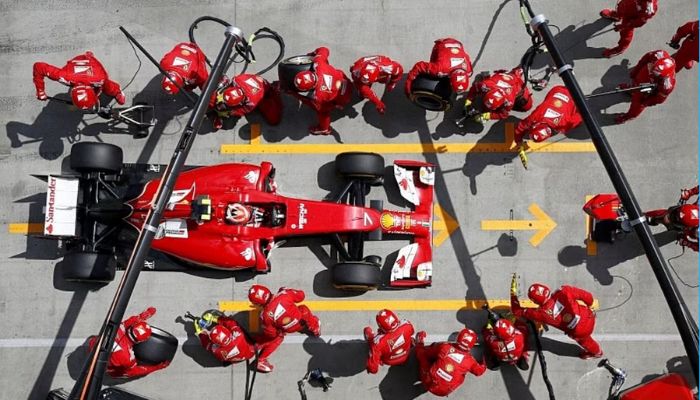A Formula 1 pit stop is a meticulously choreographed ballet of precision, speed, and teamwork. In a matter of seconds, a team of skilled mechanics and engineers perform a series of tasks to service the car, ensuring it can continue the race at peak performance. Don’t forget to claim rewards: explore 1xBet bonuses today and see how they can help you to wager on everything that happens in an F1 pit stop.
Let’s start with the entry. As the driver approaches the pit lane, they have to decelerate from speeds exceeding 200 mph (322 km/h) to about 60 mph (97 km/h) before entering the pit lane. This requires incredible precision and control.
Every millisecond counts in Formula 1. The average duration of a pit stop is around 2-3 seconds, and the fastest recorded pit stop in history stands at an astonishing 1.82 seconds by the Red Bull Racing Team in 2019. This record-breaking feat demonstrates the incredible efficiency and teamwork involved.
Changing all 4 tires is a pivotal aspect of a pit stop. Each tire is secured using a high-torque pneumatic gun, and the fastest recorded tire change was just 1.82 seconds, as mentioned earlier. Teams aim to complete this task in under 2 seconds consistently. When exploring the 1xBet bonuses, make sure to claim rewards and see how to wager with them on which tires will be used by an F1 driver.
Formula 1 cars no longer refuel during pit stops due to safety concerns. However, it’s worth noting that a typical refueling operation used to take around 8-12 seconds to transfer approximately 90 kilograms (198 pounds) of fuel.
Sometimes, teams make aerodynamic adjustments during pit stops. This can include changing the angle of the front and rear wings to optimize the car’s performance on the track. These adjustments can be completed in a matter of seconds.
Safety and data are paramount
Pit stops require clear communication between the driver and the team. Drivers have to accurately convey any issues they are facing with the car or their strategy preferences. This communication is often done through radio, and it must be quick and precise. Enjoy the promo power: 1xBet’s winning edge is unbeatable, especially when wagering on what is likely to happen during a F1 pit stop.
Safety is a top priority in Formula 1. Mechanics often perform quick safety checks, such as ensuring all 4 wheel nuts are securely fastened and that there are no loose parts on the car. These checks are crucial to prevent accidents on the track.
While not immediately visible during a pit stop, data analysis plays a significant role. Teams constantly monitor data from the car to make strategic decisions, such as when to pit and which tire compounds to use. This data analysis happens in real-time and is essential for race strategy.
A typical F1 pit crew consists of around 20-25 members. They include:
- tire changers;
- mechanics;
- engineers;
- and support staff.
Read, Winning Margin Betting for Football Fans
These individuals are highly trained and specialized in their roles, and their coordination is vital for a successful pit stop. Enjoy 1xBet’s winning edge today, where there is a great promo power that you can enjoy when wagering on a F1 pit stop too.
Each team brings an inventory of tires to a race, which can include various compounds for different track conditions. The number of tire sets available per driver per race weekend is limited. Teams must manage their tire allocation strategically to optimize performance.
Also, teams strategize when to make pit stops based on factors like tire wear, fuel load, and track conditions. The number of pit stops in a race can vary, with some races having as many as 4 or more stops.
Drivers experience intense G-forces during pit stops due to the rapid movements and accelerations involved. They must withstand these forces while maintaining precision.
Finally, the cost of a Formula 1 pit stop is significant. While it’s challenging to pinpoint an exact figure, considering the salaries of the team members, equipment, and logistics, a single pit stop can easily cost a team thousands of dollars.
